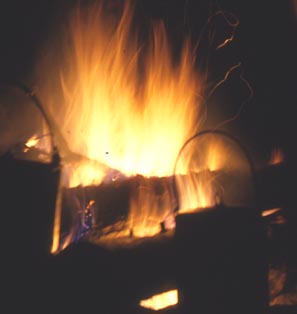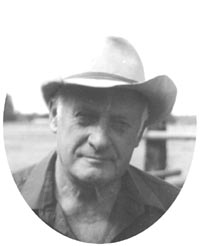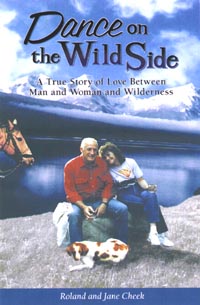a weblog sharing info on outdoor skills and campfire musing by a guy who spends a bunch of time in pursuit of both
CULTURE
WHERE -
TALES ARE TOLD OF
Welcome to Roland Cheek's Weblog
Roland is a gifted writer with a knack for clarifying reality. Looking forward to more of his wisdom
- Carl Hanner e-mail
Life is not measured by the number of breaths we take, but by the number of moments that take our breath away.
He who smiles rather than rages is always the stronger.
Why, then, I must ask, are there not even more moments in my life that takes my breath away, thus allowing me to smile a bunch more?
To access Roland's weblog and column archives
Tip o' the Day!
The campfire blazed merrily, snapping occasionally at tiny gas pockets in the wood. The tent was erected, bedroll laid out. Supper was behind. As shadows stole across the quiet land, we had but to slide into the satiny linings of our mummy bags. But because we wished to get an early start in the morning, I shaved feathers on a piece of pine pitch for quick ignition.
"Bud Sayre taught me this," I said to Jane as she watched.
"So simple. A one-match operation," she replied. "Yet there's probably a lot of people who don't know the trick."
I shrugged, closed my clasp knife and reached for the headlamp flashlight we kept in our sleeping tent. "There's probably a bunch of great outdoors tips that are so routine to us we never even pause to think about them." Automatically, I unsnapped the back of the headlamp case and aligned all four of the tiny double-A batteries.
"Like that one."
"Like what one?"
"What you just did with those flashlight batteries."
I stareds at the molded plastic headlamp. She's right, of course, each night I align the batteries to provide power for the lamp. Each day, especially when we plan to move camp, I reverse two of those batteries so the lamp won't flick on even if its switch is accidentally activated.
"What other tips might we know, woman? That's the kinds of things about which weblogs are crafted."
"How about the flashlight itself?"
"True," I murmured. We started using headlamp flashlights back in the old days, when we still operated our guide service into the Bob Marshall. Headlamps were so much more sensible than the old hold-'em-in-your-mouth D-cell barn flashlights, especially for saddling horses in the dark. Even better than hanging a gas lantern from a tree limb because there were no shadowy places a headlamp won't illuminate, provided you swing your head that direction.
(Next week, more tips)
I have just finished The Phantom Ghost of Harriet Lou. Wow! It was wonderful! I was transported from my stateroom aboard a destroyer to the wilderness I roamed as a teenager. Your tales were well told, enlightening and dead on the money. The open ocean on a calm clear night is beautiful, but I'll never hear the hoarse bellow of a rutting bull. Driving a warship from the bridge into heavy seas and tailing green water is exhulting, but not nearly as much as stumbling across grizzly tracks that haven't begun to fill in. Thank you for sharing with me. My dad sent me the Thursday Great Falls Tribune, no matter where I am in the world for the last 13 years. I have always enjoyed your writing, but this book was special.
HUNTING CAMP DEMOCRACY
There are few inter-social entities as democratic as that of a hunting camp, especially a camp composed of friends. The longer their tradition of bonding together in the fall, the more entrenched is that camp's democracy.
Yes there are members in any hunting camp who hold more authority than others. But such authority is more sway than sovereign -- a right earned through contribution or experience.
The choice of which week or weeks to hunt, for example, is seldom as much command as consensus.
We are told major decisions were made in similar fashion among many Indian tribes. Move camp? Consensus was usually reached to do so after it became clear to the council that hunters must ride farther and farther to find meat, that available dry wood was nearly depleted, that grass for their ponies was turning short.
Where to move? Perhaps one chief recalls that the buffalo jump on the North Fork of the Two Medicine River had been good to the tribe in the past. Perhaps an old woman remembers that "cat's ear" bulbs were easy to dig on the Two Medicine hillsides' southern exposure. And another old woman might recall the thick stands of cottonwoods and abundant willows growing in the Two Medicine bottoms. Another chief could observe that hills to the north of the valley, and cutbanks to the east, offered excellent protection when the winds turned bitterly cold.
Eventually consensus was reached. It was a consensus arrived at not by command, but from experience and knowledge. The knowledge held by the elders was respected and was always applied to their present circumstances in order to benefit the whole.
So it is in most well-functioning hunting camps. "I remember back in '78," one veteran might recall, "when I hit the forks of Valley Creek with the wind coming off my left shoulder ...." The wind might be doing a slow drift from the left at that very moment, and three younger members from camp may hurry away to the forks of Valley Creek.
In most quality hunting camps, nobody tells others where to hunt, or how to hunt, or when to hunt. Instead, like happened in Indian encampments, coups are recounted, memories drawn, word pictures portrayed, examples provided. But whether the young braves trot out to check on the elders' recollections is entirely up to those with the eagerness of youth.
It's a fine thing that veteran hunters' zeal for the chase flags just as younger hounds take up pursuit. It's democracy in action in its finest form. No votes are taken, no oligarchic weight thrown. There's no consulship, no magistery. Just cooperation.
In the best camps, that cooperation extends to chores and responsibilities. Again, no orders are given or taken. "It's my turn to do dishes," one youngster cries. "I'll dry," says another.
Wood is cut, split, carried, and burned by consensus and cooperation. Vehicles are serviced, game handled, food cooked -- usually agreed to by all -- by those who are best at it. Camps are buttoned up during a storm by those with watchful eyes. And elders will fret and stew about the efficacy of their younger members.
But an autocracy -- a good, well-functioning hunting camp is not.
Roland Cheek wrote a syndicated outdoors column (Wild Trails and Tall Tales) for 21 years. The column was carried in 17 daily and weekly newspapers in two states. In addition, he scripted and broadcast a daily radio show (Trails to Outdoor Adventure) that aired on 75 stations from the Atlantic seaboard to the Pacific Ocean. He's also written upwards of 200 magazine articles and 12 fiction and nonfiction books. For more on Roland, visit:
www.rolandcheek.com
Recent Weblogs
Tuesday, October 14, 2008
There's a bunch of specific info about Roland's books, columns, radio programs and archives. By clicking on the button to the left, one can see Roland's synopsis of each book, read reviews, and even access the first chapter of each of his titles. With Roland's books, there's no reason to buy a "pig in a poke."
for detailed info about each of Roland's books
Read Reviews
Read their first chapters
For interested educators, this weblog is especially applicable for use in history, science, and environmental classes, as well as for journalism students.
Roland, of course, visits schools. For more information on his program alternatives, go to:
NEXT WEEK:
THE HELL HOLE
www.campfireculture.com
source links for additional info
to send this weblog to a friend
to tell Roland what you think of his Campfire Culture weblog
to visit Roland's newspaper columns and weblog archives
Just finished Dance On the Wild Side. It is a wonderful!!! book. Was unable to put it down until I finished it. Want a harcover Bob Marshall book
In the wonderful, descriptive way Cheek aficionados have come to expect, he brings the bears and other wilderness denizens to life in the reader's imagination. The book [Chocolate Legs] is not a documentary. Neither is it a novel. Cheek has simply filled in the blanks with plausible storylines. The animals and events he describes arise from knowledge gained during a life in the mountains observing nature in general, but with concentration on elk and bears.
- Rural Montana
A friend recently loaned me a book to read, saying, "You and this man have a lot in common, and I think you will enjoy this book very much." I told her that I was already reading two books, and that it might be quite a while before I could get yours back to her. That evening I picked up your book My Best Work is Done at the Office, and I was reading it until 2:00 in the morning. I haven't touched my other books since! I just finished this and am about to start Chocolate Legs. My other books can wait. - H. Robert Krear / Estes Park, CO
- Frank Morgan / Willamina, OR
Roland's best selling book, in its 5th printing
- Author unknown
- Author unknown








